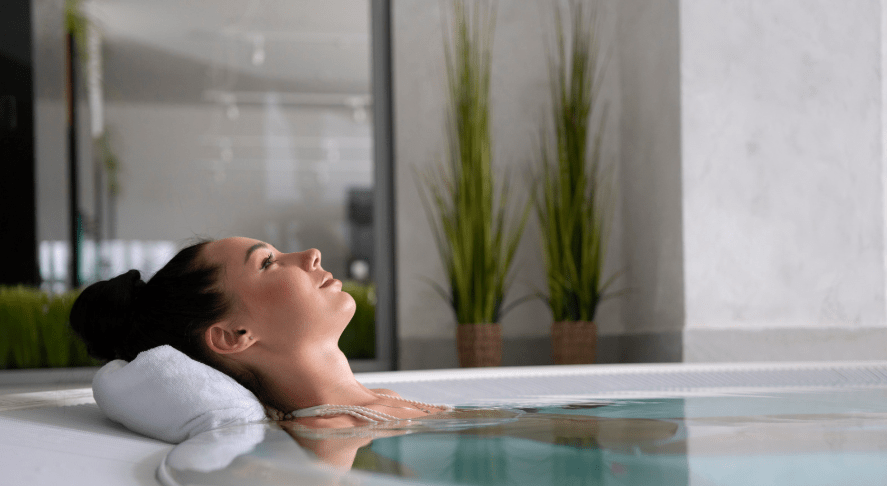
What is the ideal temperature for a Spa or Jacuzzi?
|
Time to read 5 min
|
Time to read 5 min
The topics of this article
Welcome to the world of spas, where relaxation and well-being are at the heart of the experience. In this article, we will explore the crucial question: “WHAT IS THE IDEAL TEMPERATURE FOR A SPA OR JACUZZI?” Temperature plays a major role in the comfort and enjoyment of your spa experience, and knowing how to set it is essential to maximize the benefits. Let’s discover together what makes the perfect spa temperature, taking into account the seasons, personal preferences, and expert advice.
Immerse yourself in an oasis of relaxation with our spa, where the water temperature can vary according to your desires and the weather conditions. Typically, our guests enjoy a water temperature between 32 and 38 degrees, offering a luxurious and soothing experience, whether in winter or summer. In winter, what could be better than warm water, perfect for relaxing muscles and soothing the mind after a cold day?
And in summer, refresh yourself with cooler water, ideal for recharging your batteries after a sunny day and sharing happy moments with your loved ones. What's your favorite temperature for a relaxing getaway in our spa? Here are some tips for achieving the ideal temperature for a spa or jacuzzi.
A well-adjusted spa temperature has many benefits. It promotes muscle relaxation, which is perfect after a long day of work or intense physical activity. Additionally, warm water stimulates blood circulation, which helps reduce stress and improve overall well-being. Users also report improved sleep quality after regular spa sessions.
The benefits don't stop there. An optimal temperature promotes mental relaxation, reducing anxiety and daily stress. Simply immersing yourself in warm, soothing water can create an immediate sense of well-being, which is why so many people choose a spa to relax and recharge.
The ideal temperature for a hot tub varies depending on several factors, including the season. In winter, users generally prefer a warmer temperature, around 38 degrees, to counteract the cold outside. This provides instant comfort and allows you to enjoy the hot tub even in freezing temperatures. In summer, a slightly lower temperature, between 32 and 35 degrees, is more comfortable. It offers a refreshing contrast to the outdoor heat.
This variability is essential to ensure a pleasant experience all year round. Modern spas are equipped with regulation systems that allow you to easily control the temperature, allowing you to adapt the spa to your needs and the weather conditions.
The ideal temperature for a spa or jacuzzi is generally between 37°C and 40°C. This helps promote muscle relaxation and body relaxation while avoiding any sensation of excessive cold or heat .
Yes, most spas and hot tubs are equipped with a temperature control system that allows users to adjust the temperature to their personal preferences.
Maintaining the correct temperature in a spa or hot tub helps ensure a relaxing and comfortable experience for users, while avoiding the risk of hypothermia or overheating.
An ideal temperature in a spa or jacuzzi promotes muscle relaxation, improved blood circulation, relief of joint and muscle pain, as well as reduction of stress and anxiety.
Yes, it is recommended to adjust the temperature of a spa or hot tub according to the seasons. For example, it may be pleasant to maintain a slightly higher temperature in winter and a cooler temperature in summer for an optimal experience.
The maximum recommended temperature for a spa is generally 40°C. Exceeding this temperature can lead to health risks, such as heatstroke or dizziness. It is important not to exceed the temperature recommendations and to hydrate well after a spa session.



